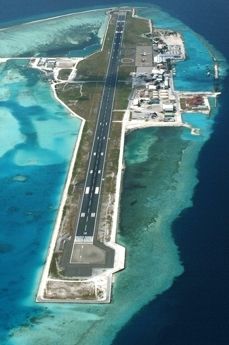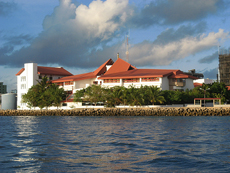This week saw the repeatedly delayed budget introduced to the People’s Majlis. Coming in at MVR17.5billion rufiya, the budget – purportedly revised to incorporate President Yameen’s austerity measures – eclipses all previous spending programmes.
A report from the World Bank made clear the tough task the new government faces in nursing the economy towards good health. The report stated that the Maldives continues to spend “beyond its means”.
Noted areas of excess include a high civil service wage bill, with the World Bank suggesting that the government’s short term financing measures risked further damaging the economy.
The exploitation of the country’s persistent shortage of dollars by criminal elements was exposed this week as police reported the activity of thieves masquerading as legitimate exchangers of currency.
When accused of illegally obtaining a budget support loan, recently reappointed Finance Minister pleaded desperation. Abdulla Jihad argued that he had sidestepped the onerous approval procedure to avoid a financial catastrophe in May 2012.
Yameen took fitful steps towards fulfilling his campaign’s austerity pledges this week, ordering the reduction of salary for two grades of state minister – though the cut was only around 12.5 percent instead of the 30-50 mooted before the election.
Similarly, the new government appeared to have reneged on its pledge to provide cash-handouts to old-age pensioners – opting for an insurance scheme instead.
Government performance
Former President Maumoon Abdul Gayoom, however, appeared pleased with his half-brother’s performance thus far, praising his handling of Indo-Maldivian relations while the Defence Minister discussed enhanced military cooperation with Indian counterparts.
The indistinct ‘National Movement’ this week suggested ulterior motives in the bureaucratic thwarting of its plan to celebrate the eviction of Indian infrastructure giant GMR, whose deal to develop the international airport was prematurely terminated twelve months ago.
Elsewhere, the coalition member Adhaalath Party, quashed rumours that it had parted ways with Yameen’s government this week, despite previous reports that it intended to campaign independently in the upcoming local and parliamentary elections.
The ‘roadmaps’ for the first one hundred days of the government continued to be drawn this week, with comprehensive lists now produced in the areas of transport, health, and immigration.
Whilst the Transport Ministry has promised finished plans for the redevelopment of Ibrahim Nasir International Airport, the health minister talked of significant changes to the IGMH public hospital.
The police service also joined in the policy pledging, with its own promises to improve its service and to build public trust in the institution. The Police Integrity Commission this week suggested that the prosecutor general assist in this task by prosecuting two officers it had found to have been negligent during the arson attack which destroyed Raajje TV in October.
The vacancy at the head of the PG’s Office did not stop the filing of charges in the 8 year old ‘Namoona Dhoni’ case. Pro-democracy activists – prevented from reaching Malé for a national demonstration – now face fresh charges of disobeying lawful orders.
Trust between the Supreme Court and the judicial watchdog appeared scant this week as the Chief Justice baulked at the JSC’s re-shuffling of a number of senior judges. Members of the JSC were later reported to have rejected Chief Justice Faiz’s legal objections.
Corruption and human rights
Confidence in the transparency of the public in public institutions also appeared to be on the wane this week, as Transparency Maldives’ Global Corruption Barometer (GCB) survey revealed that 83 percent of its sample felt corruption to have increased or stayed the same over the past two years.
Despite only appearing mid-table in the list of organisations perceived as being corrupt, the MNDF reacted disproportionately to the local media’s reporting of the survey, labelling CNM’s article on the survey “highly irresponsible journalism”.
The Anti Corruption Commission announced the discovery of graft in the capital’s largest housing programme. The highest number of bribes reported in the GCB was in the area of land services.
International human rights day was observed by the government and civil society in the same week the president ratified the country’s first anti-human trafficking bill. Whilst welcoming the new law, both the Human Rights Commission and the immigration department suggested that institutional strengthening would need to accompany a successful anti-trafficking policy.
Finally, this week saw the release of a United Nations Population Fund report, calling on the state to review existing practices related to sexual behaviour within the judicial process, law enforcement, education and health sectors.
The report stated reproductive health services ought to be expanded to non-married couples as evidence makes clear that the assumption sex does not, or should not, occur outside of marriage is increasingly out of step with social realities.
 On December 8, the Transport and Communication Ministry revealed that it would finish drafting plans and begin the groundwork within a 100 days to develop the Ibrahim Nasir International Airport (INIA) to be able to cater to 5 million passengers.
On December 8, the Transport and Communication Ministry revealed that it would finish drafting plans and begin the groundwork within a 100 days to develop the Ibrahim Nasir International Airport (INIA) to be able to cater to 5 million passengers. held today that the government was drafting a policy to “bring major development to IGMH in a very short period of time to an extent never before seen”.
held today that the government was drafting a policy to “bring major development to IGMH in a very short period of time to an extent never before seen”. Maldives National Defence Force (MNDF)’s 100 day strategic plan includes the submission of various amendments to relevant laws – including the Armed Forces Act and Narional Security Act – to the parliament, and the establishment of a ‘justice system’ within the force.
Maldives National Defence Force (MNDF)’s 100 day strategic plan includes the submission of various amendments to relevant laws – including the Armed Forces Act and Narional Security Act – to the parliament, and the establishment of a ‘justice system’ within the force.